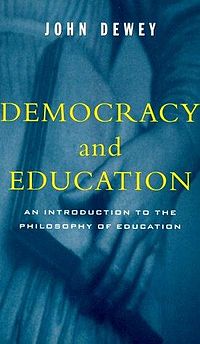- Democracy and Education
-
Democracy and Education 
Author(s) John Dewey Country  United States
United StatesLanguage English Genre(s) Non-fiction Publisher Macmillan Publication date 1916 Media type Print Pages 434 pp OCLC Number 177710 Democracy and Education: An Introduction to the Philosophy of Education is a book written in 1916 by John Dewey. .
Dewey's philosophical anthropology, unlike Egan, Vico, Ernst Cassirer, Claude Lévi-Strauss, and Nietzsche, does not account for the origin of thought of the modern mind in the aesthetic, more precisely the myth, but instead in the original occupations and industries of ancient people, and eventually in the history of science.[1] A criticism of this approach is that it does not account for the origin of cultural institutions, which can be accounted for by the aesthetic. Language and its development, in Dewey's philosophical anthropology, have not a central role but are instead a consequence of the cognitive capacity.[1]
In this book Dewey sought to at once synthesize, criticize, and expand upon the democratic (or proto-democratic) educational philosophies of Rousseau and Plato.[citation needed] He saw Rousseau's philosophy as overemphasizing the individual and Plato's philosophy as overemphasizing the society in which the individual lived. For Dewey, this distinction was largely a false one; like Vygotsky, he viewed the mind and its formation as a communal process. Thus the individual is only a meaningful concept when regarded as an inextricable part of his or her society, and the society has no meaning apart from its realization in the lives of its individual members. However, as evidenced in his later Experience and Nature (1925), this practical element—learning by doing—arose from his subscription to the philosophical school of Pragmatism.
Dewey's ideas were never broadly and deeply integrated into the practices of American public schools, though some of his values and terms were widespread.[2] Progressive education (both as espoused by Dewey, and in the more popular and inept forms of which Dewey was critical) was essentially scrapped during the Cold War, when the dominant concern in education was creating and sustaining a scientific and technological elite for military purposes.[citation needed] In the post-Cold War period, however, progressive education had reemerged in many school reform and education theory circles as a thriving field of inquiry learning and inquiry-based science.
While Dewey's educational theories have enjoyed a broad popularity during his lifetime and after, they have a troubled history of implementation.[3] Dewey's writings can also be difficult to read, and his tendency to reuse commonplace words and phrases to express extremely complex reinterpretations of them makes him susceptible to misunderstanding. So while he held the role of a leading public intellectual, he was often misinterpreted, even by fellow academics. Many enthusiastically embraced what they mistook for Dewey's philosophy, but which in fact bore little or a distorted resemblance to it.
Dewey tried, on occasion, to correct such misguided enthusiasm, but with little success[citation needed]. Simultaneously, other progressive educational theories, often influenced by Dewey but not directly derived from him, were also becoming popular, such as Educational perennialism which is teacher-centered as opposed to student-centered. The term 'progressive education' grew to encompass numerous contradictory theories and practices, as documented by historians like Herbert Kliebard.
Several versions of progressive education succeeded in transforming the educational landscape: the utter ubiquity of guidance counseling, to name but one example, springs from the progressive period. Radical variations of educational progressivism were troubled and short-lived, a fact that supports some understandings of the notion of failure. But they were perhaps too rare and ill-funded to constitute a thorough test.
See also
List of publications by John Dewey
References
- ^ a b Theodora Polito, Educational Theory as Theory of Culture: A Vichian perspective on the educational theories of John Dewey and Kieran Egan Educational Philosophy and Theory, Vol. 37, No. 4, 2005
- ^ Fifty Major Thinkers on Education (From Confucius to Dewey). Routledge, February 2002, Edited by Joy Palmer, Liora Bresler, David Edward Cooper. pp 177-178
- ^ Fifty Major Thinkers on Education (From Confucius to Dewey). Routledge, February 2002, Edited by Joy Palmer, Liora Bresler, David Edward Cooper. pp 177-178
Categories:- 1916 books
- Works by John Dewey
Wikimedia Foundation. 2010.
